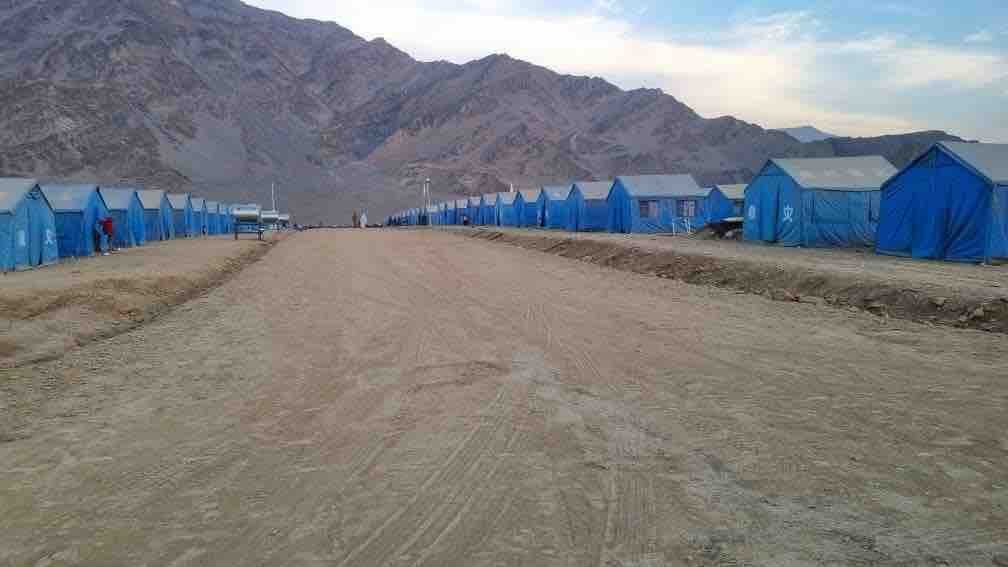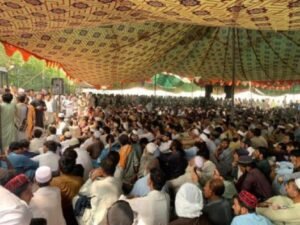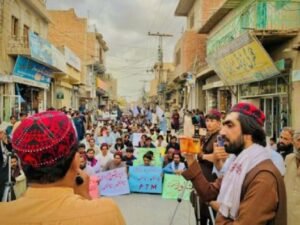Mass Afghan Deportation from Pakistan: A Brewing Crisis for Regional Stability and Development

A makeshift reception center established in 2023 along the Afghan side of the Durand Line to accommodate mass deportations from Pakistan. Photo taken by @Afghan for ADN.
By Kadeem Baloch
From April 15, right after Ramadan, Pakistan will begin the quest to send about 850,000 documented Afghan refugees back to their country of origin. Interestingly, the mass repatriation is being portrayed as a process of asking the Afghan Citizen Card holders (an ID card issued by the Pakistani government) to move back voluntarily. However, when they do not exercise their voluntarism, they would be facing arrests and deportation[1]. This is the second phase of deportation after September 2023, which gave about 1.7 million undocumented Afghans just 28 days to leave Pakistan voluntarily[2].
Though the government promised repatriation to be a phased and orderly process, the reality has been different and disappointing. The authorities have carried out mass detentions, along with seizing properties and livestock and destroying the identity documents of the refugees[3].
The deportation tensions are being accompanied by cross-border skirmishes between Pakistan and Afghanistan. Recently, Pakistan led air strikes to target militant regions in Afghanistan in retaliation to the suspected attacks by Afghan militants. It has been reported that gun battles often begin along the disputed border, and trade crossings are closed over immigration disagreements[4].
Pakistan’s claim of carrying out the mass exodus due to security concerns and increasing pressure on its struggling economy is considered a blatant excuse by analysts[5]. Experts opine that the policy stands to unleash further instability in the region, both within and across borders.
Let us understand a few aspects of the deportation process. To facilitate the deportation process, authorities plan to build large holding centers to detain foreigners pending deportation. Moreover, the state has confiscated money and property belonging to “illegal foreigners,” and the interior ministry is encouraging its citizens to report any “illegal foreigners. As a result, local law enforcement took upon them to harass the Afghan refugees at their whims. Leaders in Kabul criticized Pakistan’s act of confiscating cash and property of the returnees, calling it “theft of their property” and a violation of their rights[6][7].
The current situation needs urgent international attention as it is a crisis in the making. Pakistan’s arbitrariness in the process of deportation and the foul treatment meted out to the returnees is brewing into a massive humanitarian crisis. The confiscation of the assets of the returnees and forcible repatriation of vulnerable groups, which include a large number of women and children in Afghanistan, are tantamount to systemic injustice on humanitarian grounds. Pakistan is not only risking international peace and security, but also decelerating the process of development.
Economic Impacts of Mass Deportations
The current episode also needs to be seen from the lens of social welfare and economic development. Mass deportations are always costly. Moreover, they distract institutions like police, administration, and other law enforcement agencies from their routine tasks focusing on welfare and development. Islamabad should give weightage to the Afghan refugees who have contributed to the economy by building homes and starting businesses in Pakistan while raising their families there, but it has not[8][9]. The massive exodus is also a waste of human capital and human labor hours, which could otherwise be utilized in contributing to economic activities and regional economic growth. Research shows that refugees are integrated well into the host nation’s economy; they can boost the productivity of the nation and supply labor whenever there is a supply shortage[10]. These refugees, over time, turn into taxpayers for the economy. Given many Afghan refugees were actively participating in Pakistan’s labor market, deportation is a significant drawback for its economy.
Deportations will have immediate costs on Pakistan’s economy as well, including court costs, the cost of expanding the state’s personnel, and surveillance and enforcement capacity. Such activities are responsible for furthering the allocation of funds to developmental work. The cost should also include the imputed cost of economic hardships faced by the returnees, which implies the imputed cost to the deported population due to a lack of health facilities, sanitation, and education. The deportation process also facilitates regional instability, as we can see as a result of military tensions between the two nations. The costs are even higher when we consider the future costs of ill health, missed years of schooling, and psychological costs due to the trauma of conflicts and sudden migration. In Afghanistan, the return migrants would have to start their lives from scratch, degrading the living conditions and un-doing any progress made in human development. All in all, such haphazard policy actions by the state are detrimental to the process of social welfare and development, along with international peace and stability.
Humanitarian Crisis Escalates: Afghan Returnees Face Dire Prospects
In the wake of humanitarian, climatic, and economic crises and international sanctions that Afghanistan is currently facing, the nation is ill-equipped to welcome such a large number of repatriates. As a result, the returnees might be bereft of essential services that they need to start their lives from scratch. As Pakistan did not allow the return migrants to take money, cattle, or other assets back with them, it would proliferate their vulnerabilities, as once they cross borders, they would be under extreme deprivation and poverty. Even those who lived in Pakistan for decades had to sell their immovable assets below market price.
This large population in exodus needs to be provided with employment, health facilities, and education, which we find Afghan authorities incapable of provisioning at such short notice. Moreover, given the fundamentalist regime in Afghanistan, restrictions on education for girls and other gender-related concerns would become extremely severe. In such a situation, Pakistan can be held responsible for exacerbating a humanitarian and developmental crisis, pushing back the achievements in global human development and SDG targets. Islamabad, with its policy, stands to deteriorate regional stability and social welfare due to sheer disregard for human lives seeking asylum.
The author chooses a pseudonym. Kadeem Baloch is a freelance journalist based in Pakistan.
Note: The contents of the article are of sole responsibility of the author. Afghan Diaspora Network will not be responsible for any inaccurate or incorrect statement in the articles.
[1] https://www.rferl.org/a/pakistan-afghan-refugees-expulsions-campaign-second-phase/32870404.html
[2] https://humanrightsfirst.org/library/pakistan-must-stop-sending-afghan-refugees-back-to-danger/
[3] https://www.rferl.org/a/pakistan-afghan-refugees-expulsions-campaign-second-phase/32870404.html
[4] https://www.newarab.com/news/pakistan-launch-fresh-afghan-deportations-officials
[5] https://www.newarab.com/news/pakistan-launch-fresh-afghan-deportations-officials
[6] https://twitter.com/rtapashto/status/1720298275440361762?s=46
[7] https://www.reuters.com/world/asia-pacific/taliban-minister-raises-return-deported-afghans-assets-pakistan-visit-2023-11-17/
[8] https://www.reuters.com/world/asia-pacific/taliban-minister-raises-return-deported-afghans-assets-pakistan-visit-2023-11-17/
[9] https://humanrightsfirst.org/library/pakistan-must-stop-sending-afghan-refugees-back-to-danger/
[10] https://www.globalrefuge.org/news/what-are-the-economic-benefits-of-refugees-lirs/





